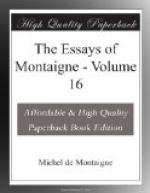As to pomp and magnificence, upon the account of which I engaged in this discourse, neither Greece, Rome, nor Egypt, whether for utility, difficulty, or state, can compare any of their works with the highway to be seen in Peru, made by the kings of the country, from the city of Quito to that of Cusco (three hundred leagues), straight, even, five-and-twenty paces wide, paved, and provided on both sides with high and beautiful walls; and close by them, and all along on the inside, two perennial streams, bordered with beautiful plants, which they call moly. In this work, where they met with rocks and mountains, they cut them through, and made them even, and filled up pits and valleys with lime and stone to make them level. At the end of every day’s journey are beautiful palaces, furnished with provisions, vestments, and arms, as well for travellers as for the armies that are to pass that way. In the estimate of this work I have reckoned the difficulty which is especially considerable in that place; they did not build with any stones less than ten feet square, and had no other conveniency of carriage but by drawing their load themselves by force of arm, and knew not so much as the art of scaffolding, nor any other way of standing to their work, but by throwing up earth against the building as it rose higher, taking it away again when they had done.
Let us here return to our coaches. Instead of these, and of all other sorts of carriages, they caused themselves to be carried upon men’s shoulders. This last king of Peru, the day that he was taken, was thus carried betwixt two upon staves of gold, and set in a chair of gold in the middle of his army. As many of these sedan-men as were killed to make him fall (for they would take him alive), so many others (and they contended for it) took the place of those who were slain, so that they could never beat him down, what slaughter soever they made of these people, till a horseman, seizing upon him, brought him to the ground.




